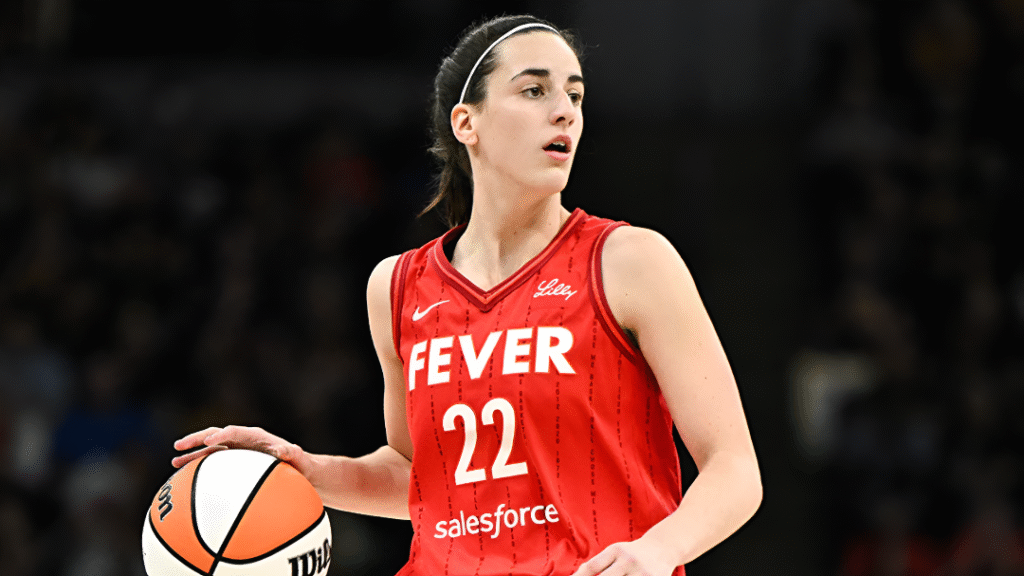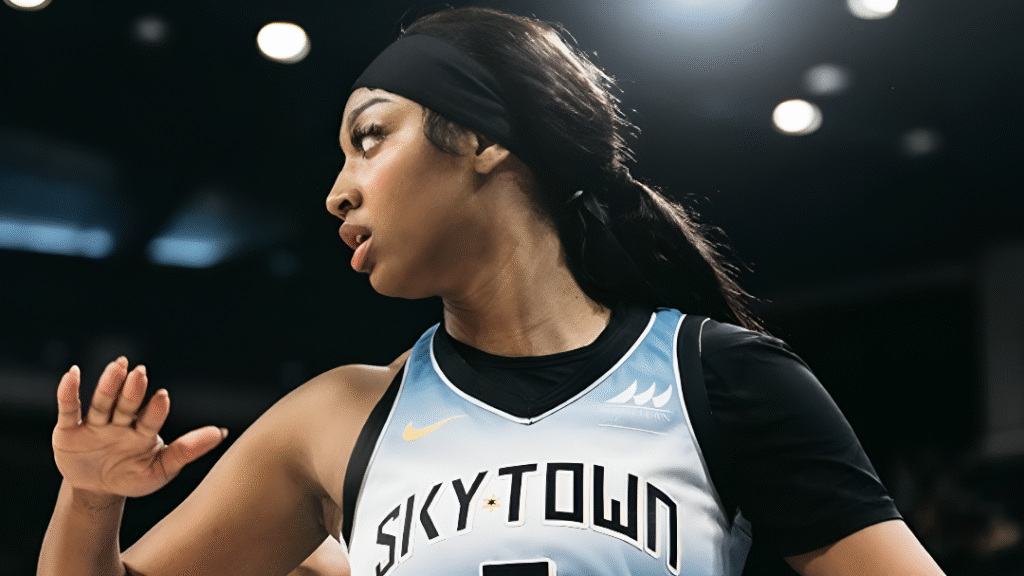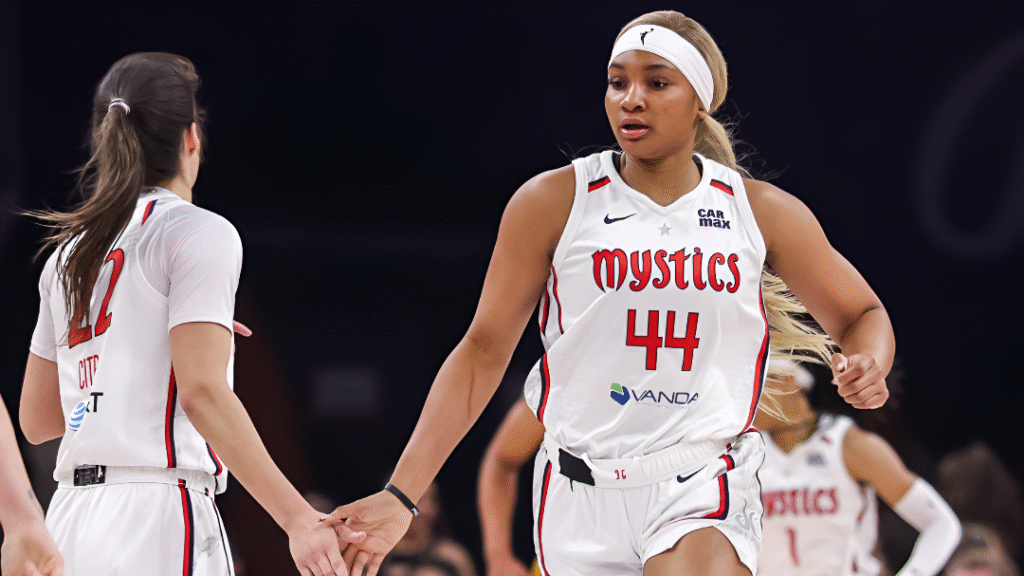Rookie of the Year WNBA — Caitlin Clark and Angel Reese are turning the award race into one of the most intense storylines of the season. Here’s a deep dive into stats, pressure points, and what’s at stake.
The Rookie Race Heats Up
Every WNBA season has its storylines — MVP chatter, playoff pushes, trade drama — but this year, the spotlight is on the rookies. Caitlin Clark and Angel Reese have turned what’s usually a quiet award into a headline war. Both players are not just meeting expectations; they’re shattering them. Rookie of the Year WNBA talk isn’t just about numbers — it’s about impact, pressure, and how these two young stars are already shaping the league.
Caitlin Clark: The Face of a New Era
Caitlin Clark walked into the WNBA carrying more weight than any rookie in recent memory. From sold-out arenas to nationally televised games, Clark’s presence alone has lifted the Indiana Fever from afterthought to must-watch.
She’s averaging double-doubles on some nights, dropping flashy passes, and knocking down logo threes that feel straight out of a video game. But it’s not just highlights — Clark has redefined what it means for a rookie to carry a franchise. The Fever’s offense completely shifts around her playmaking. Even in games where she shoots poorly, she dictates tempo, creates space for teammates, and forces defenses to change schemes.
The Rookie of the Year WNBA narrative often goes to “best stats,” but Clark’s case is bigger than that. She’s brought eyeballs, revenue, and national relevance to her team. That level of impact is rare, especially for a rookie.
Angel Reese: The Hustler, The Grinder, The Culture Changer
Angel Reese came into the league with a chip on her shoulder. Critics doubted her scoring, her efficiency, and whether her college dominance would translate. Reese didn’t just answer — she silenced everyone.
She’s become the league’s double-double machine, crashing the boards with relentless energy. When you watch Reese, you see a player who thrives on effort. Offensive rebounds, second-chance points, dirty work in the paint — things that don’t always trend on social media but win basketball games.
For the Chicago Sky, Reese has been the heartbeat. When the Sky look sluggish, it’s Reese who brings the spark. Rookie of the Year WNBA voters will notice that consistency — she’s not flashy every night, but she’s reliable. That’s the kind of player coaches dream of building around.
Stat Sheet vs. Intangibles
On paper, Clark’s numbers pop more. She racks up assists, points, and three-pointers that make highlight reels. Reese’s box scores look different — fewer points, but far more rebounds and second-chance possessions.
So, how do voters weigh that? Is Rookie of the Year WNBA about stats, or is it about who moves the needle for their team?
Clark gives you superstar electricity. Reese gives you blue-collar toughness. One fills seats, the other fills gaps on the floor. The league needs both. But the debate is fiery because they represent two very different styles of basketball excellence.
Coaches, Analysts, and Pressure Points
Coaches around the league have already chimed in. Some rave about Clark’s court vision, saying she sees the game two steps ahead. Others talk about Reese’s motor — “She just doesn’t stop,” one coach said after she grabbed 15 boards in a tough loss.
Analysts love Clark’s offensive ceiling but point to her turnovers and defense as weak spots. With Reese, they admire her rebounding but question her scoring versatility.
This back-and-forth tension is exactly why the Rookie of the Year WNBA race feels so alive. Both have flaws, but both are making noise in ways rookies aren’t supposed to.
The Fan Perspective
Step into a WNBA Twitter thread (or courtside seats), and you’ll see how divided fans are. Fever fans argue Clark is doing the impossible — carrying a team with massive expectations. Sky fans counter that Reese is more efficient and plays within the system.
What’s undeniable is the passion. Rookie of the Year WNBA talk has energized fan bases like never before. Debates run all night, memes fly, and every box score is dissected like a presidential debate. This award has become more than a trophy — it’s bragging rights, a cultural argument, and a signal of where the league is headed.
League-Wide Implications
The WNBA has been craving this kind of buzz. Rookie of the Year WNBA storylines are usually niche, but Clark and Reese turned it mainstream. ESPN runs segments, talk shows debate it, and tickets sell out when they’re in town.
This isn’t just about 2024. Clark and Reese are the foundation of the league’s next decade. Rookie of the Year might just be year one of a rivalry that defines the WNBA, the way Bird and Magic once shaped the NBA.
Who Really Deserves It?
If the season ended today, Clark probably edges it based on numbers and spotlight. But Reese’s case is growing louder — especially if the Sky make a playoff push while the Fever stumble.
The truth is, both deserve recognition. But Rookie of the Year WNBA voters can only pick one. Do you reward flash and leadership (Clark) or grit and consistency (Reese)? Either way, the league wins — because this debate itself is proof of how far women’s basketball has come.
Conclusion
The Rookie of the Year WNBA race is no longer just a box on an awards ballot. It’s a storyline that’s shaping the season, igniting fans, and fueling the future of the league. Caitlin Clark and Angel Reese aren’t just rookies — they’re pioneers of a new era. And no matter who takes home the award, the WNBA has already scored its biggest win: relevance, passion, and momentum.
Also Read: Latest Trending News


